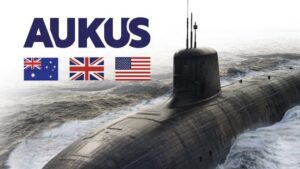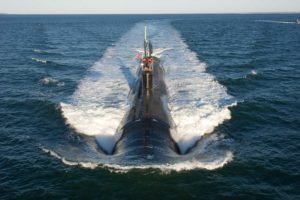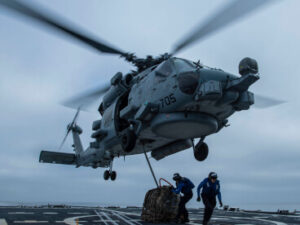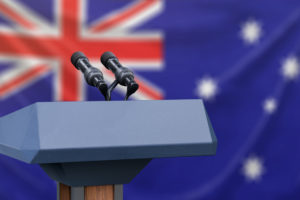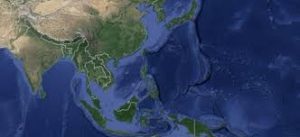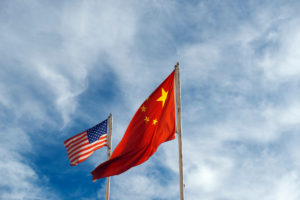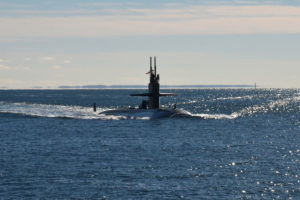The signing of AUKUS a little more than a year ago divided international opinion. Much of the criticism about the agreement linking the UK and the US to Australia’s ambition to acquire nuclear-powered submarines focused on the potential negative consequences of the proliferation of nuclear powered submarines in the Indo-Pacific region. The main arguments set forth against AUKUS point to the fact that capabilities of this kind invite arms racing, leaving the door open to the additional step of arming future Australian boats with nuclear weapons. To the pact’s key detractors, therefore, Australian nuclear boats have a risk of becoming part of the problem, not the solution, to regional stability and military balance.
This notion misses, however, a key assumption informing the pact. AUKUS’ emphasis on the procurement and development of advanced capabilities to operate in the maritime domain speaks to a worldview in which maritime stability is a central pillar to the stability of the Indo-Pacific, and the wider international order. The pact reveals how leaders in the three capitals perceive the importance of the in international affairs in that the technology that allows to better operate in, and from, this domain has critical value to national security. This is the reason why critics miss the fundamental point that AUKUS is not about nuclear deterrence. It is about how conventional capabilities will enable in the future to maintain an open and safe maritime order.
Understanding the relationship linking maritime stability to national security is, in turn, central to fully appreciate the strategic value of AUKUS. This is not, however, a trifling task as it requires international observers to appreciate how much the conceptualisation of national security within the three members of the AUKUS has changed. From this perspective, stabilisation operations in central Asia and in the Middle East and North Africa no longer constitute the centre of gravity of international security. State actors have replaced non-state organisations in mounting the prime challenge to the stability of the international order, shifting the geopolitical frontlines to the maritime space. From the North Atlantic to the South China Sea and the Polar regions, revisionist governments predominantly – but not exclusively – in Moscow and Beijing seek to manipulate, if not upend, the architecture sustaining open societies to serve the stability of their regimes.
The International Order of a Maritime Century
Yet, what does it mean to live in a maritime century? The answer rests upon three interlinked reasons. First, the ocean underwrites today’s global physical and digital connectivity, bringing societies closer together by delivering the raw materials upon which the benefits of economic interdependence are ensured. Second, it is a resource that demands concerted efforts to ensure its sustainable management, inviting responsible governance. Third, it is the largest staging platform for the projection of capabilities that empower states, or coalitions, with the choice to extend the use of force for the purpose of statecraft well beyond their borders.
Today, maritime connectivity, governance, and statecraft are the function of, and the drivers behind, modern prosperity. It is a well-known fact that some 90% of global trade is carried by sea. It is perhaps less well known that some 97% of world’s communications are delivered by 1.2 million km of submarine cables. Every year, maritime transportation – both physical and digital – provides societies the world over with access to products and services that, as Steven Lovegrove – the former UK National Security Advisor – put it, ‘previous generations could only have imagined’.
By a similar token, ocean management is an inherent component of how societies are rethinking sustainable living standards. Journalist Ian Urbina documented how some 56 million people – more than twice the population of Australia – work on fishing boats to meet global food demands. Even more significantly, half of the world’s population lives within a hundred miles of any coastline. Today, the ocean accounts for more than half of the oxygen supporting human life and it fuels the water cycle that delivers fresh water. It supports pioneering efforts to generate clean electricity such as offshore wind technology, and it is able to store more carbon per unit than forests. It is no exaggeration to argue that the ocean stands at the heart of any environmentally sustainable future.
The above invites an additional observation. In the 21st century, the economic and political aspects of the link between the sea and societies have considerably expanded. By contrast, the strategic dimension of the use of the sea to support states’ influence has become more diffused and less obvious. The ability to extend the reach, lethality, and sustainability of maritime forces – on the surface, underwater, and in the air – had already redefined diplomacy and war in the 20th century. Sea control was instrumental in the victory of the maritime alliances of two world wars. Negotiations over the size and shape of naval armaments underwrote the hierarchy of international relations in the period between the two wars, whilst strategic deterrence at sea set the pace of the Soviet-American struggle in the Cold War.
Today, the post-Cold War US-led experience in the expeditionary projection for crisis response – from disaster relief to counter-piracy – and ‘wars of choice’ has hardly undermined the value of the sea in international affairs. Indeed, debates about overseas basing in Washington, Beijing, London, and Berlin, to mention a few cases, speak to the notion of the ocean as a critical manoeuvre space. In China, debates over ‘strong points’, bases, overseas are part of a broader debate concerning President Xi Jinping’s declared intention to transform the country into a maritime power. This, in turn, is connected to his signature connectivity project known as Belt and Road Initiative (BRI). Yet, the western political habit to intervene in crises the world over has proven to have limits. The ability to project power has not been matched by a capacity to control the outcome of interventions, as operations in Somalia, Iraq, Afghanistan, Syria, and Libya have highlighted.
Concurrently, as demand for ocean governance increased, so have the opportunities for state actors – not merely those that can bolster large navies – to exert degrees of maritime influence. This is because this notion extends today to law-enforcement and constabulary missions and, as a result of this, is no longer the prerogative of major powers alone, but of any coastal state with the capacity to assert its claims. On the one hand, less sophisticated, or asymmetric, capabilities are contributing to redefine regional orders and operational balance through the contestation of maritime rights. The experience of the Chinese Coast Guard in challenging the Japanese control of the Senkaku Islands, or that of the various fishing militias and small local coast guards around the South China Sea have brought to full fruition the type of challenge first highlighted during the Cold Wars between Britain and Iceland. Iceland in fact proved that small irregular forces could keep a larger and more sophisticated force in check.
In this maritime century, the ocean is a critical source of prosperity through connectivity and sustainable development, but for that reason it has also become a frontline of geopolitical confrontation, one in which nations can show leadership or have it contested; they can enhance global governance or drive fragmentation and assertion of sovereign rights. It is the place in which the exercise of some form of influence to pursue national prosperity can sustain a stable international order or plants the seeds to unravel it.
National Security in a Maritime Century
What are the national security implications of a maritime century? The core observation in this regard pertains to the extension of the link between maritime affairs and national security beyond matters of power projection and sea control. This link is first and foremost about maritime resilience and integration. Both have material components since they concern the hardware of this order – from shipping to port infrastructures, from undersea cables to energy pipelines, and indeed maritime forces. Military power underwrites, supports, and reinforces – nationally and through alliances – this wider understanding of the connection between the sea and national security.
From this perspective, the infrastructure underpinning modern maritime connectivity is a clear example of the limits of today’s resilience. International shipping rests on a network of fast aging ports supporting a supply chain system that has showed to be under unprecedented stress since the beginning of the Covid-19 pandemic. In the UK, a preview of this vulnerability had occurred before. The triple disaster (earthquake, tsunami, and nuclear meltdown) that affected the Tohoku region in Japan in March 2011 created rippling effects in the supply of primary components that directly affected automobile factories in Britain.
The more recent blockade of the Black Sea region and the subsequent disruption of grain from Ukraine has further emphasised how disruptions to shipping of raw materials in one part of the world have effects well beyond the boundaries of its immediate neighbourhood. By a similar token, the damage sustained by the pipelines Nord Stream 1 and 2 linking Russia to Germany has exposed the vulnerability of energy supplies to state actors with the means to operate effectively under water.
Relatedly, digital connectivity stands no less vulnerable. Submarine cables can be interfered with, damaged, or indeed cut, with significant economic losses, which can be exponentially more impactful on economies relying on single cables for their connective capacity. Reportedly, in 2017, a single cable was accidentally cut off the coast of Somalia by a ship’s anchor. The Internet outage lasted approximately three weeks and it cost the country approximately 10 million USD each day. On that occasion, the consequences were not purely economic, since the Internet outage complicated efforts to combat a nationwide drought that had half of the population in need of assistance.
Against this background, authoritarian regimes possess the means and, crucially, the capacity to control them in an integrated fashion, to exploit the fragility of the maritime order to advance their agenda. They deploy different military, paramilitary, and non-military tools of statecraft to assert national power and claimed rights, to increase regional influence, or to limit other actors’ maritime connectivity and projection capacity. They can coordinate, or sequentially link, different tools with applications across issues of connectivity and resilience. Russian and Chinese military authorities and state-controlled enterprises can – and indeed have – reportedly exerted influence in this complex system, from the use of fishing fleets in the South Atlantic, to oil rigs in the South China Sea, or by constraining the flow of data. They have modernised their capabilities and sought greater integration among land-based, cyber, and sea going capabilities, from missiles to UUVs, from cyber to electromagnetic jamming capabilities.
Policy documents like the recent UK integrated review (IR) titled Global Britain in a Competitive Age have captured the need to create greater resilience of the UK as a complex economic and social system, and better integration across different departments’ of government for the purpose of national security. In 2019, the Department of Transport’s vision for the British maritime sector titled Maritime 2050 represented an important step towards a more informed conversation to enhance resilience. Beyond this, one critical normative aspect of concern that emerged from the IR revolves around digital connectivity. A key issue will be how to integrate developments in the existing frameworks regulating the use of the sea with the approach to frameworks in domains that will play a more significant role in the shaping of future maritime order. In this context, approaches to behaviour in cyber and space should aim at reinforcing the connectivity and openness of the maritime order.
AUKUS and conventional maritime deterrence in Europe and the Indo-Pacific
Why does, therefore, AUKUS matter strategically? As a technology accelerator agreement for the purpose of national security, AUKUS is designed to allow the three countries to work closely together to translate the promise of today’s maturing technologies such as quantum and artificial intelligence into tomorrow’s military edge in the maritime domain.
In this regard, AUKUS is not about achieving stability through a form of deterrence delivered by nuclear-armed submarines. In fact, the opposite is true. At close scrutiny the working groups set up to deal with the nuclear submarine programme, and the advanced capabilities invites an important observation. AUKUS’ main aim is to elevate the intelligence and deterrent value of conventional capabilities to keep oceans open and safe from state coercion. Safe and secure shipping lanes and intact underwater sea cables and pipelines are the engine fuelling economic prosperity and political stability. This is true in the Indo-Pacific, as elsewhere. AUKUS is, therefore, a down payment to prevent one of the most critical components of the international order from being further destabilised. It is a down payment on the role that new technologies will have in preventing, or failing that, winning, future wars in which the maritime domain has a role to play.
Yet, like any investment in future capabilities – the first submarines will be delivered by 2040 – AUKUS is likely to change over time. The sensitive nature of the advanced capabilities explored in the collaboration, from submarines to hypersonic missiles, will invite greater proximity and strategic convergence among the partners. The recent news that Australians submariners will train on British boats implies the understanding of such a demand, and the willingness to pursue it. Yet, in a context in which advanced technology will matter increasingly more to maintain a military edge, only trusted partners will be able to achieve the most from defence collaborations. In AUKUS’s case, renewed conversations about cooperation between Australia and France, and among Japan and AUKUS partners, indicate that AUKUS is not an exclusive club, but one with a membership defined by high standards of innovation and information security.
This does not mean that AUKUS will not face challenges along the way. Implementing the agreement will put national industrial capacity across the three countries under pressure. Recent comments from senior American officials suggest that building the initial boats in the US would be problematic. Similar considerations apply to the UK. In Australia, a considerable amount of efforts will have to focus on the development of the industrial capacity to maintain an effective submarine force. On the other hand, until the propulsion system is chosen, the design and building of the boats remain an open question. When considered against the impact of technology on future changes in systems and sensors, the division of labour is likely to remain a major changing variable.
What is certain is that one year on AUKUS has started to chart a clear path as to what it is, and why it matters. AUKUS is set on a path about a maritime informed worldview in which accelerating advanced technology cooperation might very well make the difference in how strategic advantages can be secured, and maritime stability can be maintained.
